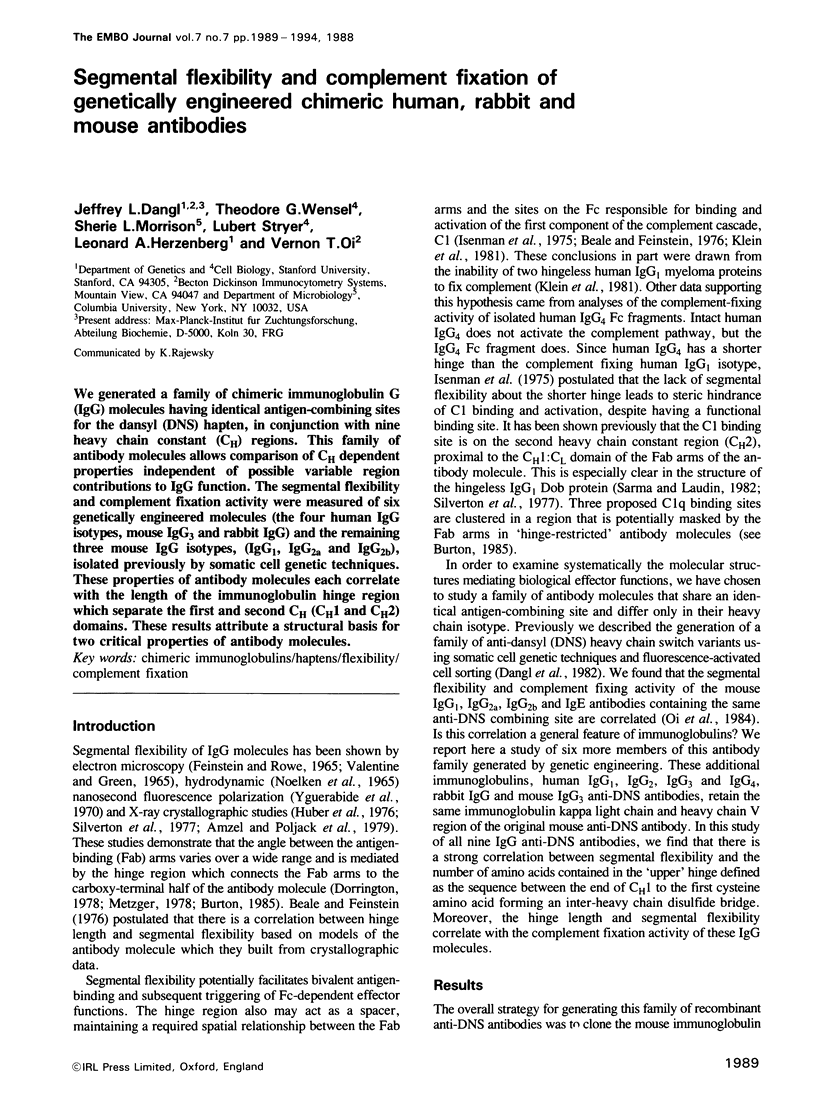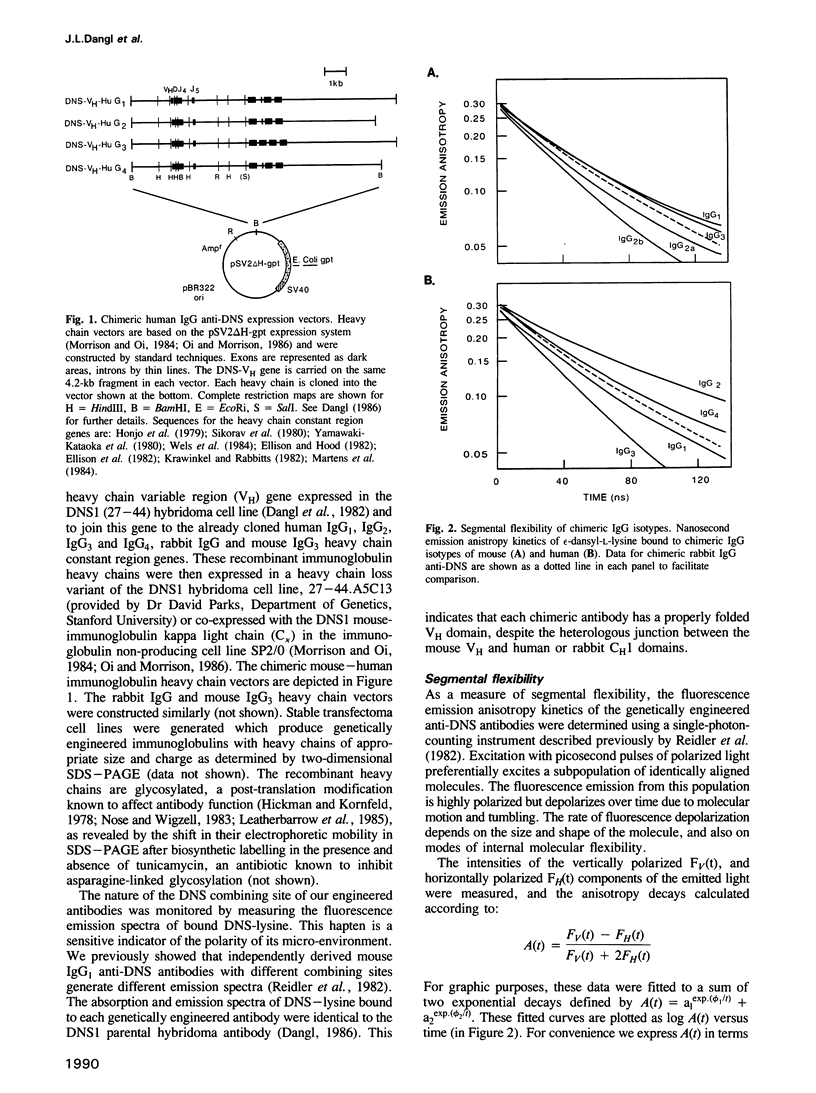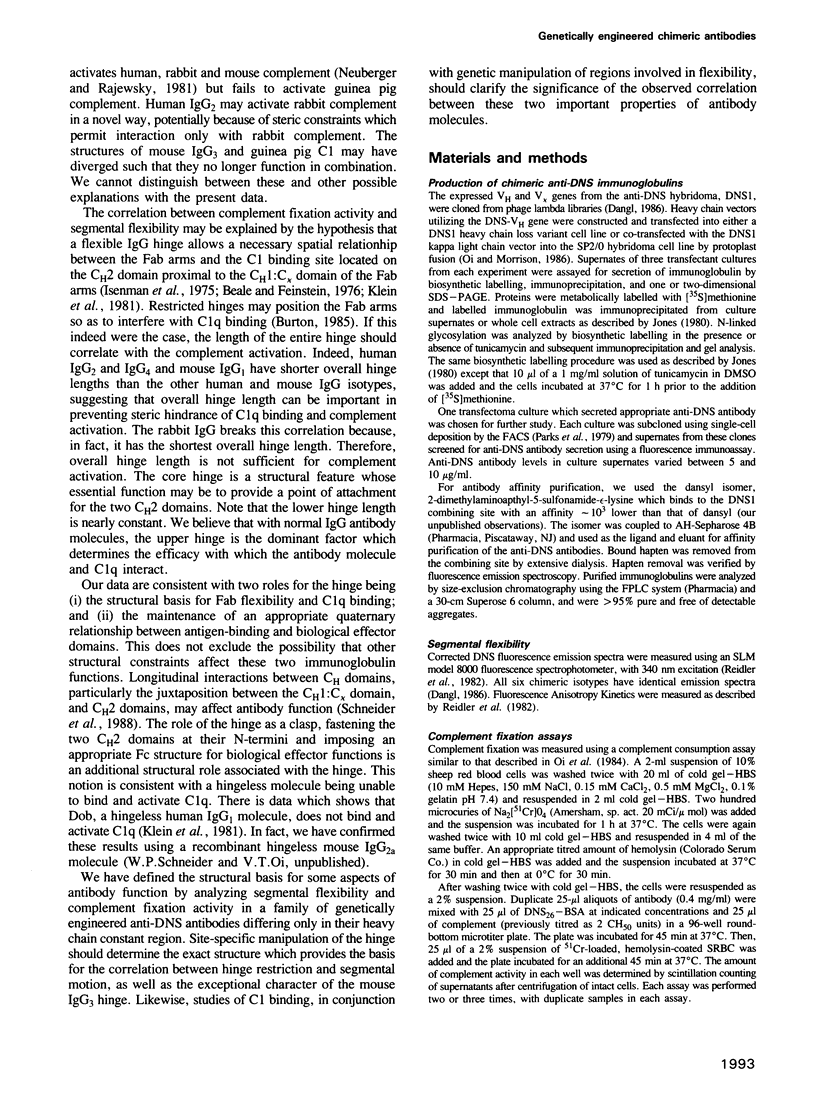Abstract
We generated a family of chimeric immunoglobulin G (IgG) molecules having identical antigen-combining sites for the dansyl (DNS) hapten, in conjunction with nine heavy chain constant (CH) regions. This family of antibody molecules allows comparison of CH dependent properties independent of possible variable region contributions to IgG function. The segmental flexibility and complement fixation activity were measured of six genetically engineered molecules (the four human IgG isotypes, mouse IgG3 and rabbit IgG) and the remaining three mouse IgG isotypes, (IgG1, IgG2a and IgG2b), isolated previously by somatic cell genetic techniques. These properties of antibody molecules each correlate with the length of the immunoglobulin hinge region which separate the first and second CH (CH1 and CH2) domains. These results attribute a structural basis for two critical properties of antibody molecules.
Full text
PDF





Selected References
These references are in PubMed. This may not be the complete list of references from this article.
- Amzel L. M., Poljak R. J. Three-dimensional structure of immunoglobulins. Annu Rev Biochem. 1979;48:961–997. doi: 10.1146/annurev.bi.48.070179.004525. [DOI] [PubMed] [Google Scholar]
- Beale D., Feinstein A. Structure and function of the constant regions of immunoglobulins. Q Rev Biophys. 1976 May;9(2):135–180. doi: 10.1017/s0033583500002390. [DOI] [PubMed] [Google Scholar]
- Burton D. R. Immunoglobulin G: functional sites. Mol Immunol. 1985 Mar;22(3):161–206. doi: 10.1016/0161-5890(85)90151-8. [DOI] [PubMed] [Google Scholar]
- Dangl J. L., Parks D. R., Oi V. T., Herzenberg L. A. Rapid isolation of cloned isotype switch variants using fluorescence activated cell sorting. Cytometry. 1982 May;2(6):395–401. doi: 10.1002/cyto.990020607. [DOI] [PubMed] [Google Scholar]
- Dorrington K. J. The structural basis for the functional versatility of immunoglobulin G1. Can J Biochem. 1978 Dec;56(12):1087–1101. doi: 10.1139/o78-172. [DOI] [PubMed] [Google Scholar]
- Ellison J. W., Berson B. J., Hood L. E. The nucleotide sequence of a human immunoglobulin C gamma1 gene. Nucleic Acids Res. 1982 Jul 10;10(13):4071–4079. doi: 10.1093/nar/10.13.4071. [DOI] [PMC free article] [PubMed] [Google Scholar]
- Ellison J., Hood L. Linkage and sequence homology of two human immunoglobulin gamma heavy chain constant region genes. Proc Natl Acad Sci U S A. 1982 Mar;79(6):1984–1988. doi: 10.1073/pnas.79.6.1984. [DOI] [PMC free article] [PubMed] [Google Scholar]
- FEINSTEIN A., ROWE A. J. MOLECULAR MECHANISM OF FORMATION OF AN ANTIGEN-ANTIBODY COMPLEX. Nature. 1965 Jan 9;205:147–149. doi: 10.1038/205147a0. [DOI] [PubMed] [Google Scholar]
- Hanson D. C., Yguerabide J., Schumaker V. N. Segmental flexibility of immunoglobulin G antibody molecules in solution: a new interpretation. Biochemistry. 1981 Nov 24;20(24):6842–6852. doi: 10.1021/bi00527a016. [DOI] [PubMed] [Google Scholar]
- Hickman S., Kornfeld S. Effect of tunicamycin on IgM, IgA, and IgG secretion by mouse plasmacytoma cells. J Immunol. 1978 Sep;121(3):990–996. [PubMed] [Google Scholar]
- Honjo T., Obata M., Yamawaki-Katoaka Y., Kataoka T., Kawakami T., Takahashi N., Mano Y. Cloning and complete nucleotide sequence of mouse immunoglobulin gamma 1 chain gene. Cell. 1979 Oct;18(2):559–568. doi: 10.1016/0092-8674(79)90072-2. [DOI] [PubMed] [Google Scholar]
- Huber R., Deisenhofer J., Colman P. M., Matsushima M., Palm W. Crystallographic structure studies of an IgG molecule and an Fc fragment. Nature. 1976 Dec 2;264(5585):415–420. doi: 10.1038/264415a0. [DOI] [PubMed] [Google Scholar]
- Isenman D. E., Dorrington K. J., Painter R. H. The structure and function of immunoglobulin domains. II. The importance of interchain disulfide bonds and the possible role of molecular flexibility in the interaction between immunoglobulin G and complement. J Immunol. 1975 Jun;114(6):1726–1729. [PubMed] [Google Scholar]
- Ito W., Arata Y. Proton nuclear magnetic resonance study on the dynamics of the conformation of the hinge segment of human G1 immunoglobulin. Biochemistry. 1985 Nov 5;24(23):6467–6474. doi: 10.1021/bi00344a024. [DOI] [PubMed] [Google Scholar]
- Klein M., Haeffner-Cavaillon N., Isenman D. E., Rivat C., Navia M. A., Davies D. R., Dorrington K. J. Expression of biological effector functions by immunoglobulin G molecules lacking the hinge region. Proc Natl Acad Sci U S A. 1981 Jan;78(1):524–528. doi: 10.1073/pnas.78.1.524. [DOI] [PMC free article] [PubMed] [Google Scholar]
- Krawinkel U., Rabbitts T. H. Comparison of the hinge-coding segments in human immunoglobulin gamma heavy chain genes and the linkage of the gamma 2 and gamma 4 subclass genes. EMBO J. 1982;1(4):403–407. doi: 10.1002/j.1460-2075.1982.tb01182.x. [DOI] [PMC free article] [PubMed] [Google Scholar]
- Leatherbarrow R. J., Rademacher T. W., Dwek R. A., Woof J. M., Clark A., Burton D. R., Richardson N., Feinstein A. Effector functions of a monoclonal aglycosylated mouse IgG2a: binding and activation of complement component C1 and interaction with human monocyte Fc receptor. Mol Immunol. 1985 Apr;22(4):407–415. doi: 10.1016/0161-5890(85)90125-7. [DOI] [PubMed] [Google Scholar]
- Marquart M., Deisenhofer J., Huber R., Palm W. Crystallographic refinement and atomic models of the intact immunoglobulin molecule Kol and its antigen-binding fragment at 3.0 A and 1.0 A resolution. J Mol Biol. 1980 Aug 25;141(4):369–391. doi: 10.1016/0022-2836(80)90252-1. [DOI] [PubMed] [Google Scholar]
- Martens C. L., Currier S. J., Knight K. L. Molecular genetic analysis of genes encoding the heavy chains of rabbit IgG. J Immunol. 1984 Aug;133(2):1022–1027. [PubMed] [Google Scholar]
- Morrison S. L., Oi V. T. Transfer and expression of immunoglobulin genes. Annu Rev Immunol. 1984;2:239–256. doi: 10.1146/annurev.iy.02.040184.001323. [DOI] [PubMed] [Google Scholar]
- NOELKEN M. E., NELSON C. A., BUCKLEY C. E., 3rd, TANFORD C. GROSS CONFORMATION OF RABBIT 7 S GAMMA-IMMUNOGLOBULIN AND ITS PAPAIN-CLEAVED FRAGMENTS. J Biol Chem. 1965 Jan;240:218–224. [PubMed] [Google Scholar]
- Neuberger M. S., Rajewsky K. Activation of mouse complement by monoclonal mouse antibodies. Eur J Immunol. 1981 Dec;11(12):1012–1016. doi: 10.1002/eji.1830111212. [DOI] [PubMed] [Google Scholar]
- Nose M., Wigzell H. Biological significance of carbohydrate chains on monoclonal antibodies. Proc Natl Acad Sci U S A. 1983 Nov;80(21):6632–6636. doi: 10.1073/pnas.80.21.6632. [DOI] [PMC free article] [PubMed] [Google Scholar]
- Oi V. T., Vuong T. M., Hardy R., Reidler J., Dangle J., Herzenberg L. A., Stryer L. Correlation between segmental flexibility and effector function of antibodies. Nature. 1984 Jan 12;307(5947):136–140. doi: 10.1038/307136a0. [DOI] [PubMed] [Google Scholar]
- Parks D. R., Bryan V. M., Oi V. T., Herzenberg L. A. Antigen-specific identification and cloning of hybridomas with a fluorescence-activated cell sorter. Proc Natl Acad Sci U S A. 1979 Apr;76(4):1962–1966. doi: 10.1073/pnas.76.4.1962. [DOI] [PMC free article] [PubMed] [Google Scholar]
- Reidler J., Oi V. T., Carlsen W., Vuong T. M., Pecht I., Herzenberg L. A., Stryer L. Rotational dynamics of monoclonal anti-dansyl immunoglobulins. J Mol Biol. 1982 Jul 15;158(4):739–746. doi: 10.1016/0022-2836(82)90258-3. [DOI] [PubMed] [Google Scholar]
- Sikorav J. L., Auffray C., Rougeon F. Structure of the constant and 3' untranslated regions of the murine Balb/c gamma 2a heavy chain messenger RNA. Nucleic Acids Res. 1980 Jul 25;8(14):3143–3155. doi: 10.1093/nar/8.14.3143. [DOI] [PMC free article] [PubMed] [Google Scholar]
- Silverton E. W., Navia M. A., Davies D. R. Three-dimensional structure of an intact human immunoglobulin. Proc Natl Acad Sci U S A. 1977 Nov;74(11):5140–5144. doi: 10.1073/pnas.74.11.5140. [DOI] [PMC free article] [PubMed] [Google Scholar]
- Valentine R. C., Green N. M. Electron microscopy of an antibody-hapten complex. J Mol Biol. 1967 Aug 14;27(3):615–617. doi: 10.1016/0022-2836(67)90063-0. [DOI] [PubMed] [Google Scholar]
- Wels J. A., Word C. J., Rimm D., Der-Balan G. P., Martinez H. M., Tucker P. W., Blattner F. R. Structural analysis of the murine IgG3 constant region gene. EMBO J. 1984 Sep;3(9):2041–2046. doi: 10.1002/j.1460-2075.1984.tb02089.x. [DOI] [PMC free article] [PubMed] [Google Scholar]
- Yamawaki-Kataoka Y., Kataoka T., Takahashi N., Obata M., Honjo T. Complete nucleotide sequence of immunoglobulin gamma2b chain gene cloned from newborn nouse DNA. Nature. 1980 Feb 21;283(5749):786–789. doi: 10.1038/283786a0. [DOI] [PubMed] [Google Scholar]
- Yguerabide J., Epstein H. F., Stryer L. Segmental flexibility in an antibody molecule. J Mol Biol. 1970 Aug;51(3):573–590. doi: 10.1016/0022-2836(70)90009-4. [DOI] [PubMed] [Google Scholar]


